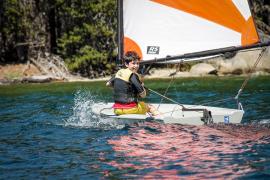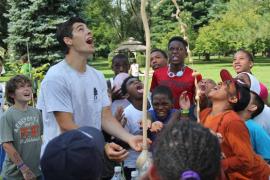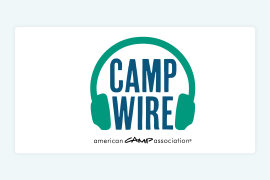Summer camps engage children and young adults of all ages and generations — from the youngest staff members to the oldest campers (including teen leaders). Thus, it is imperative for camp directors to take full stock of what each generation represents and responds to.
In many ways, we are at the intersection where "generations" converge. There are currently six of them alive in America, according to social psychologist Jean M. Twenge, PhD, author of Generations. As defined by Twenge, they include the Silents (born 1925–1945), Baby Boomers (1946–1964), Gen X (born 1965–1979), Millennials (1980–1994), Gen Z (also iGen or Zoomers, born 1995–2012), and an as-yet-unnamed generation born after 2012.
For all intents and purposes, and practically speaking, it is the last two that likely capture those attending camp. Thus, their outlooks, decisions, and developmental prerogatives dictate how (and if) they can be effectively woven into the tapestry of the camp experience.
Encompassing all generations are the three primary tasks of adolescence (defined here as ages 12–24): identity, independence, and object (peer) relations. As work in these areas happens both simultaneously and sequentially (depending on the degree of urgency), the title of this article uniquely captures the developmental dispositions of whom we will work with.
I (Stephen) wished I had thought of the title myself (it was the name of a movie about being present), for it reflects the inner chaos of youth development. For Will, this article has prompted him to "travel back in time" to reflect on his own experiences and personal growth at summer camp.
Identity Formation
For many young people, the process of forming a stable identity takes center stage during the all-important transitions from middle school to high school and high school to whatever comes next. Perhaps college?
Who am I? Whom will I become? Who do I want to be?
Seminal questions during these stages of human development revolve around identity, relationships, and future goals. Will shares, "I am a college graduate, though nearly a year removed from graduation, so that ‘alumnus’ status feels less a badge of honor than a reminder of a period when I was in control." To some degree, the chaos continues.
His retrospective journey prompted him to take a deep dive into his own identity, emerging independence, and relationships with peers.
"As a high school senior, I reveled in bounties of anticipated freedom. The transition meant moving out of my hometown and beginning a new life removed from the oversight of my parents. The dramatic separation was surely aided by my day/overnight camp experiences," Will explains.
For Will, an only child, to sleep away from home had once been an unimaginable burden to bear.
"I had quelled the fear during my camp days and was then focused on the unencumbered expanse of possibilities that would stretch before me at Wake Forest, a nine-hour drive from my small town in New York.
"I left behind the high school parties. The light beer. My parents’ kitchen table.
"At Wake Forest I could do anything and be anyone. Such a degree of freedom was at once both enthralling and daunting."
On Becoming Independent
Obviously, independence is a critical task during the college years:
"I found my people at Wake Forest, joining a fraternity, the student newspaper, and some intramural sports teams. Academically, there were so many departments and classes to choose from. I had no sense of what I hoped to one day do for a living, so I wanted to experience all of these offerings.
"In time I honed my interests, leaning further into my classes in the journalism and film departments. These classes so strongly appealed to me because the projects I completed were so often labors of love.
"A devotion to storytelling, in both written and visual mediums, began to take shape as my calling!"
Peer Relationships
That said, Will admits that his transition to college was not without challenge or concern:
"For example, my first text conversation with my soon-to-be freshman roommate reflected my anxieties (and maybe his).
"I found him on Instagram. His profile picture was a Boston Terrier — a cute little guy but wholly unhelpful in my pursuit to discern anything about who I’d be sleeping in the same room with for the next eight months.
"Dogs are always good signs, I thought, right?
"I scrolled. His bio was in Spanish. Should I be worried?
"I typed a short message.
"Will: Hey, Anthony. Looks like we’ll be spending a lot of time together soon!
"I asked myself 'What should I say first?' I’ve got to introduce myself, but then what? I want to sound cool, but not too cool. If he thinks I’m really cool off the bat, then I’ll have to maintain that façade of coolness for the next year, at least.
"Playing it cool for so long would be tough.
"What’s taking this guy so long to respond? Does he speak English? Maybe he doesn’t understand my message.
"Then I heard back.
"1:18 p.m. Anthony: Hey! Yeah, we will.
"Thank God he speaks English.
"Will: Where are you from?
"Anthony: I live in Honduras but was born in Miami. Have you been to Latin America?
"Will: Yeah, I went to Costa Rica on vacation a bunch of years ago. I’m not sure if that’s considered Latin America. Ha ha.
"I placed an inordinate amount of importance on that first conversation, believing it would set the tone for the next two semesters.
"Now, more than four years later, I can tell you Anthony is one of my best friends. We had a tremendous time together freshman year (despite losing several months due to COVID-19) and remained close friends through senior year, when we were roommates once again. The memories from that time overflow — from the spring break trip we took down to Honduras to meet his family, to the half-marathon we ran together in Asheville, North Carolina."
Connecting the Dots
A foundational friendship was a weight off Will’s shoulders, and he was gaining momentum in the classroom too:
"A magazine writing class I took during my junior year revealed an opportunity to have my first piece of long-form nonfiction published in a magazine. That same semester, a documentary filmmaking class I took resulted in a screening of my short film at a local film festival. For the first time, people beyond myself, my parents, and my professors were reading and witnessing my creativity. The gratification fueled the passion and precision I put into future projects.
"The classroom work led to professional opportunities. I was interviewing Olympic athletes, leading a team of interns in podcasting projects, and managing a slew of underclassmen as the head of our student newspaper.
"All that work ate up a lot of time, which sometimes came at the cost of other commitments. Taking advantage of the resources and opportunities Wake offered helped me to compartmentalize different facets of my college experience."
Finding His "Peeps"
Will describes the great efforts Wake Forest took to alleviate the uneasiness and stress that comes with “finding your people” freshman year:
"As with most every other aspect of collegiate life, what I got out of it was entirely dependent on what I put into it. Here is an example of activity I participated in that helped me fill out a circle of friends, peers, and mentors.
"Freshmen Book Clubs — Each year, Wake Forest chooses a theme, then selects a number of books that relate to the theme and invites incoming freshmen to choose one book to read over the summer.
"I believe that such programs offer valuable insights for summer camps seeking to engage campers and staff in the type of community-building most are seeking, even if they don’t involve books!"
But What Did Six Years of Summer Camp Have to Do with All of This?
Will says, "It may sound like a cliché, but if there’s one thing about my camp experience that seemed helpful, it was forcing me outside of my comfort zone, requiring the development of new relationships with kids of different ages, and figuring out how to earn the respect of my counselors, who served as great and important role models."
Sleeping Away from Home — Showing Up
For many, including Will, the transition from sleeping in his own bed to being away at college was the most difficult:
"No doubt, the biggest hurdle for me was sleeping away from home. And I went to a day camp that had overnights!
"As a kid, I detested the idea of sleeping away from home, so I ditched countless sleepovers in the wee hours of the morning — calling my dad once my friends and their parents had fallen asleep and pleading with him to pick me up from the neighbor’s house.
"It was the summer after 6th grade that I vowed to complete my camp’s yearly overnight trip, but when the day arrived and I had packed my overnight bag (sleeping bag, stuffed animals, and snacks), I did not want to go. I wailed and wailed: I was not going. We were going upstate, meaning that if I got on that bus, Dad wasn’t coming to pick me up, no matter what. I don’t remember how I was coerced out of the car and onto that bus later that morning, but I was. I boarded with swollen eyes.
"While my friends enjoyed the activities the locale had to offer — rock climbing, water skiing, trapezing, and more — I thought only of the purgatory of my upcoming night. And then something strange happened: I saw my good friend, Nick, sitting across the lawn with eyes as swollen as mine. For the rest of the day and into the evening, Nick and I shared hell together. We sat apart from the group while everyone else played baseball. Counselors tried to reason with us, but we were inconsolable. We sat alone at dinner, tears dripping onto grilled cheese sandwiches. We were miserable. But at least we were miserable together.
"Somehow Nick and I survived the night. With the sleeping portion of the trip in the rearview mirror, we enjoyed day two more than any of our other friends did. When it was time to board the bus the following afternoon, we didn’t want to go home!
"As a result of opening myself up to an experience that I knew would make me uncomfortable (even if that was opening up very, very begrudgingly), I met someone who felt the same way I did. Nick and I both felt better when we realized there was someone else who shared our fear. Had we failed to board the bus the prior morning, we would have sat alone in our miseries, and that would have been exponentially worse. That there was someone else here who felt the same way I did was an insight I never would have gleaned had I not taken the step outside of my comfort zone."
Making Choices
Will says that one of the greatest parts of summer camp was the opportunity to make choices on his own, or at least with minimal input from others:
"As a senior camper at my day camp, in the afternoon we filled our own schedule with choice 'electives.' But with so many options to choose from, my gut reaction was always to follow my friends. There was safety and comfort in going where they went, which was reassuring.
"It wasn’t until the end of the summer that I ventured away from my group, because no one else wanted to go to the elective that I did: floor hockey.
"I had some trepidation at first. Who was I going to hang out with? What if I didn’t know anyone there? But my fears were assuaged when I arrived. Inevitably, there was an interest in and passion for hockey that I shared with these campers. After all, we had all chosen to be here as opposed to anywhere else."
Connecting With Counselors
Another challenge that awaited Will at camp was finding ways to build relationships with those older than he was, especially counselors:
"At camp, I was in almost constant contact with this peer group just a few years older.
"Many of my counselors were in college. It was always interesting to pick these guys’ brains. Where did they go to college? What was college even like? Did they still talk to their friends from camp? We could talk about matters that were personal with them more than we ever could with schoolteachers — for example, did they have girlfriends?
"There was a duality between getting to know these guys while still showing them respect, which was always a tricky line for a bunch of middle-schoolers to walk. These types of conversations and interactions resembled those I had during my underclassman years at Wake Forest — whether it be talking to an older student in one of my classes or socializing with the older guys during the fraternity rush period. I wanted to be personable and make friends with the older guys, but at the same time, I did not want to tip the delicate balance of established hierarchies."
Growing Up
One young man’s experiences at camp and college point to the sometimes meandering process of growing up. Moreover, they highlight important developmental stages all must master and the many steps — some small, some big — it takes to get there.
That is how summer camps help emerging adults.
Stephen Gray Wallace is president and director of the Center for Adolescent Research and Education (CARE). He has broad experience as a school psychologist and adolescent/family counselor and serves as a consultant to educational institutions, including summer camps. He is also a member of the professional development faculty at the American Academy of Family Physicians and American Camp Association and a parenting expert at kidsinthehouse.com, NBCUniversal's Learn, and WebMD. For additional information about Stephen's work, please visit StephenGrayWallace.com.
Will Zimmerman originally hails from New York and graduated summa cum laude from Wake Forest University in May 2023 with a BA in Interdisciplinary Creative Studies, a degree combining courses across the film, journalism, and creative writing departments. With his degree, Will had the unique latitude to explore storytelling in a wide variety of formats and media. He has published two magazine-length stories in “The Assembly,” a magazine committed to deep reporting on places, people, and power in North Carolina. Will has also produced several narrative films and documentaries, including “A Story About Food (and Everything But),” which screened at the RiverRun International Film Festival in 2022, and “El Sazón,” which won the Alumni Choice Award at the Trinity Film Festival in 2023.
Reference
Twenge, Jean. (2023). Generations: The real differences between Gen Z, Millennials, Gen X, Boomers and Silents — And what they mean for America’s future. New York, NY: Atria Books.




